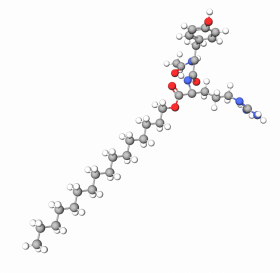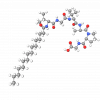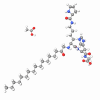Acetyl Dipeptide-1 Cetyl ester (Lipo-dipeptide Tyr-Arg, with the sequence N-Acetyl-Tyrosyl-Arginyl-Hexadecyl Ester or NATAH) is an active lipopeptide developed by Sederma known under the trade name Idealift™.
This lipopeptide exhibits good stimulating results on elastin production. As a result, Acetyl Dipeptide-1 Cetyl ester fights against cutaneous sagging and decreases the visible effects of gravity on the skin, accentuating flaccid jowls due to aging or daily aggressions.
The efficacy of Lipo-dipeptide Tyr-Arg was demonstrated in vitro by measuring elastin synthesis and elastin fiber architecture. The quantity of elastin/tropoelastin settled in the extracellular matrix after release from the fibroblasts increased by more than 94%.
Idealift™ has also been shown to intervene in the various stages of elastic tissue formation and maturation. Elastic tissue consists of elastin and different proteins acting as a guide and enabling anchoring and stabilization; enzymes are also necessary for development (Fibrillin-1, fibulin-5, and lysyl oxidase in particular).Tests were conducted on 26 female volunteers aged 54 to 75 with sagging skin. Women applied a cream containing 4% Acetyl Dipeptide-1 Cetyl ester twice a day for two months.
The effects of this new active ingredient were proven after just one month. They were confirmed using various evaluation techniques (Aeroflexmeter®, a new device developed and patented by Sederma, FOITS, and self-evaluation). As a result, the visible effects of gravity decreased, cutaneous sagging was fought, and for 80% of panelists, their skin was firmer.
This is an ideal ingredient for formulas against skin sagging that also improves resistance to gravity and firmness, helping women look younger.
Mechanism of action
Molecules that mediate events and activities in our organism fall into several classes of chemical nature: steroids, amines, peptides, and a group of sundry various other substances. Peptides appear to play a vital role in the modulation of neural activity and signaling: neurotensin, substance P, enkephalin, and endorphin are but a few identified in this field.
The dipeptide NATAH (Acetyl Dipeptide-1 Cetyl ester) was developed based on the discovery that the dipeptide Tyr-Arg has a natural existence in the body: its neuronal activity via stimulation of nerve cell release of met-enkephalin, an opioid neuromediator with an analgesic activity has been demonstrated. The chemical modification (N-acetylation and O-hexadecyl-esterification) is necessary to ensure sufficient skin penetration and bioavailability.
Previous clinical trials have shown that the peptide possesses analgesic activity when applied topically to the skin: heat sensation, chemical stinging, and mechanical aggression are felt less strongly after using the peptide incorporated in cosmetic preparations. The present disclosure teaches that the mechanism of this analgesic potency appears to be
based on the release of enkephalin precursors in the skin; furthermore, it was discovered that the peptide also has muscle relaxant activity.










